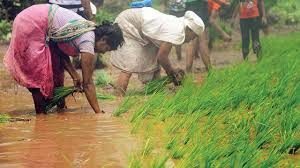
ASHA-Kisan Swaraj & Gujarat Vidyapith
November 2-4, 2018, Ahmedabad
As a gathering of more than a thousand farmers and their well-wishers, innovators, activists, scientists, field workers, policy makers and policy analysts, adivasis, women and people from marginalized communities, we are filled with immense hope and the deep sense that a different world is possible. Seed savers who have conserved thousands of valuable varieties, farmers from all corners of the country who are successfully practicing ecological farming, adivasis demonstrating how to live in deep harmony with nature, women farmers, tenant farmers and landless farmers organizing struggles to assert their rights over land and livelihood, producers organized into successful collectives, innovators developing appropriate technology, energetic youth from various sectors going back to farming, urban consumers who are ready to look beyond the market logic and citizens standing in support of farmers – hundreds of such people at the Sammelan and their stories of thousands of others who are doing similar work – give us this sense of hope. 
Not only is a different world possible, it is imperative. A world where…
– All farmers practice agriculture which is in tune with nature – with diverse crops and diverse livestock, strengthening and replenishing the soil, water and the farm ecosystem, using natural inputs which come out of a biological cycle and not a chemical industry, with animal husbandry playing an integral role.
– Diverse seeds and seed systems that thrive in the hands of farmers in an open system without exclusive rights and with access to all. Resilience to changing climate is built by farmers use biodiversity and ecological agriculture.
– Groundwater and surface water are used optimally, and agriculture thrives in rainfed areas by focusing on soil moisture conservation, protective irrigation and suitable cropping.
– Farming and the physical work involved is respected as a harmonious way of life and livelihood playing a critical sustaining role for human civilization. The economic system gives the rightful value to primary produce, whether crops, animal or forest produce. Trade and exchange of goods and services will be non-exploitative and sustainable.
– Small farmers get sufficient income out of agriculture and allied activities to lead a dignified life. Farmers are protected from indebtedness and have social security which is suitable to their needs. Financial institutions are in control of the communities.
– Agricultural land is in the hands of those who work directly on the land as producers, common property resources and community rights are protected, land is not forcibly taken from farmers, and real cultivators including tenant farmers have the right to all support systems. A fair balance between agriculture and other sectors becomes the basis of land use.
– Women are recognized as farmers in their own right, and they have the right to land and their rightful role in decision-making within the family, community and at the larger level.
– The rights of Adivasis and forest-dwellers to use forest land and produce sustainably, including the community rights, are upheld, and their exploitation is ended.
– By effectively organizing into collectives for planning their agriculture, processing and marketing the produce, as directly as possible to the end-consumers, small farmers are in a position to set the terms for what they can produce sustainably and to get a fair price.
– Safe, non-toxic and nutritious food is available to every person including children, to eliminate malnutrition and nourish humanity.
– Every citizen, urban and rural, understands the critically important role of the annadatas and primary producers, is ready to pay the fair price and respect agriculture as a profession, and participates and strengthens their struggles for livelihood and justice.
Such a world is not just desirable but it is essential for the survival of civilization itself. We also believe that India is in a unique position to be an example to the whole world in building such a society and economy. We urge that the governments should play their role in ensuring that we achieve this.
In particular, the governments should adopt and truly implement policies and laws which
- Mandate and facilitate an urgent shift to ecologically sustainable agriculture
- Ensure that rights to the agricultural resources including land, water, seed and forests are assured to the actual producers including agricultural workers, tenant farmers, women farmers and adivasis, and prevent these resources from going into corporate control
- Ensure that a minimum dignified income is assured to all agricultural households through various measures that include assured remunerative prices, credit access, insurance, disaster relief, favorable trade policies, support to farmers’ collectives and adequate social security.
- Prevent injustice to the farming community, particularly the marginalized sections such as adivasis, landless workers, women farmers and tenant farmers
- Ensure that safe, non-toxic, nutritious food is available to all people.
The government should implement all the existing laws for the protection of farm community including the Land Acquisition Act (2013), the land reform laws, Forest Rights Act, MGNREGS, and the Environmental Protection Act.
We give a call to the farming community, the entire society and the governments that this is a civilizational juncture which demands that all of us step up to our duty. We resolve that each of us will work with our whole heart and energy to build such a world, and this would be our journey towards true Swaraj.






